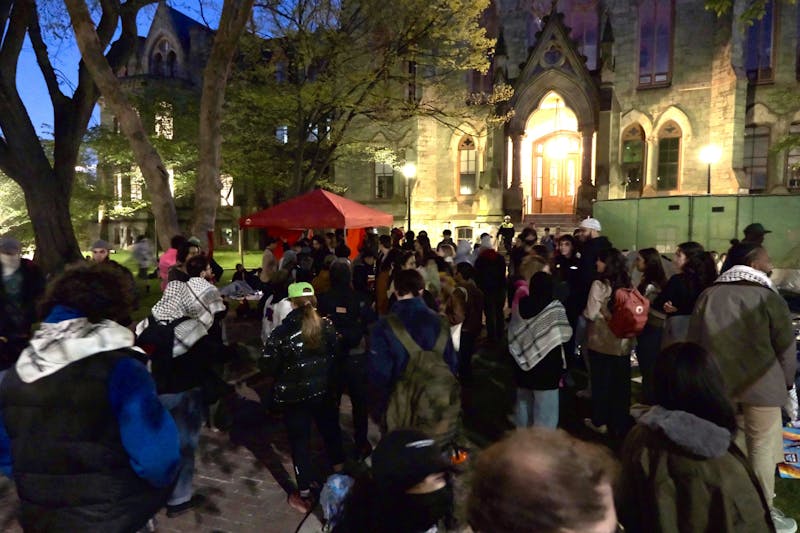
The University Task Force on Antisemitism recently submitted recommendations to Interim Penn President Larry Jameson.
Credit: Kylie CooperThe University Task Force on Antisemitism submitted its final report to Interim Penn President Larry Jameson, issuing recommendations addressing areas including campus culture, University values, and academic programming.
The report was shared in an email to the Penn community on May 30.
Former Penn President Liz Magill initially established the task force in November 2023. The task force — created alongside the Presidential Commission on Countering Hate and Building Community — was charged with providing critical feedback and actionable solutions when it comes to tackling antisemitism.
Here are five key takeaways from the suggestions outlined in the task force’s final report.
1. The University must define and assert its values
The report stated that Penn must define values that reject hate and promote empathy, respectful dialogue, and critical thinking. The task force wrote that defining these values would provide a common ground during difficult times and help community members understand the responsibilities they have to each other.
According to the task force, Penn lacks an articulated set of core values, making it difficult to effectively address issues like antisemitism. The group advised that Penn should create a “concise values statement” outlining the core values of the University.
The task force recommended that Penn investigate culture at the University in regards to housing, dining, and social activities, as well as other activities that contribute toward creating a united community.
2. Penn should increase the emphasis on Jewish and cross-cultural studies
The task force recommended that Penn strengthen faculty expertise and program offerings in Jewish studies, including by hiring new professors and creating grants for courses on complex issues and diversity. Additionally, the group suggested that the University incorporate education on antisemitism and civil dialogue into student orientations to promote understanding and respect for diversity among the student body.
The task force recommended allocating more resources to existing programs like “Campaign for Community,” “Conversations With Community,” “Dinners Across Differences,” and “Projects for Progress.” Furthermore, the group advocated for an increase in funding for educational programs created outside the classroom that focus on understanding and respecting differences.
The task force also recommended that the University allocate resources to Penn Hillel and other Jewish organizations on campus to allow them the ability to expand their programs and activities. They also suggested that the University actively recruit Jewish students, faculty, and staff, including those who are more religious, to maintain a diverse Jewish community.
The report added that Penn should increase security measures for all religious institutions on campus, with a specific focus on Jewish institutions that have been targeted by antisemitism.
3. Penn should re-issue a clear statement expressing the University's opposition to divestment, sanctions, or boycotts against Israel
The task force recommended that the University formally restate its opposition to divestment from Israel publicly and immediately, arguing that academic freedom and open exchange of ideas are vital and that divestment isolates and hinders collaboration. Additionally, the report stated that the University should continue to expand successful academic collaborations with Israeli institutions.
“We recommend that the University re-issue a clear statement on its opposition to divestment, sanctions or boycotts against Israel, the most recent of which was made by then President Gutmann in 2011,” the group wrote.
The task force acknowledges the right of individuals to support divestment in the report. However, they believe the University itself should oppose such actions due to their discriminatory and anti-intellectual impact and that Penn should reaffirm its commitment to open exchange across political differences.
4. Penn must define what is protected under its Guidelines on Open Expression and what is not
The task force recognized that the current open expression guidelines have gaps and ambiguities, and thus enforcement is uneven. To that end, the group recommended a review of the Guidelines to ensure the policies are consistent, clear, transparent, reflect Penn's values, and are applied equitably, especially regarding antisemitism.
The report noted that members of the task force disagreed on how specific to be regarding “time, place, and manner” when enforcing the Guidelines. Some members proposed clarifying policies on virtual spaces, ID verification, and the use of the Penn logo for both virtual and in-person events.
Others recommended upholding existing policies on sound amplification and building occupation, prohibiting encampments, strictly regulating non-Penn individuals in protests, and prohibiting masks to conceal protesters’ identities.
A third group argued that the task force should not make specific recommendations on the time, place, and manner aspects of protests and the enforcement of the Guidelines, but rather allow the University to handle those decisions through existing channels.
5. Channels for incident reporting must be available and upheld
The task force emphasized the importance of a robust and transparent system for reporting bias incidents at Penn. They proposed a two-part approach to this system, which includes a process for streamlined and clear reporting as well as enhanced transparency.
The task force wrote that the current scattered nature of bias incident reporting processes across various offices and platforms confuses the community. The group recommended centralizing data collection and clearly communicating all bias incident reporting options to the community, with the goal of simplifying the reporting process and providing a clearer picture of trends on campus and the broader community climate.
The group also recommended that Penn provide regular updates on reports, investigations, and their outcomes. This includes statistics on the nature of reports, the findings from investigations and determination of responsibility, and the consequences imposed.
The report acknowledged the need to comply with privacy laws, including FERPA and employment policies, to protect the rights of all involved parties, and emphasized that improvements must be implemented while safeguarding privacy.
The Daily Pennsylvanian is an independent, student-run newspaper. Please consider making a donation to support the coverage that shapes the University. Your generosity ensures a future of strong journalism at Penn.
Donate










